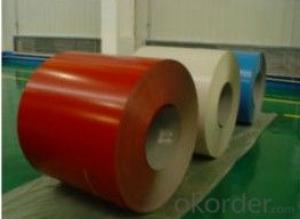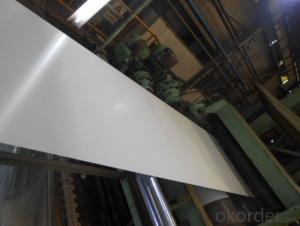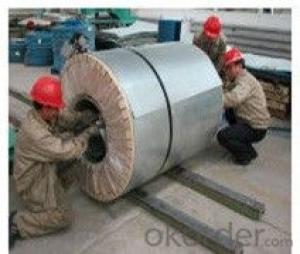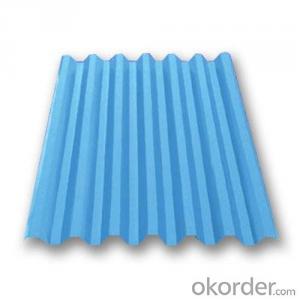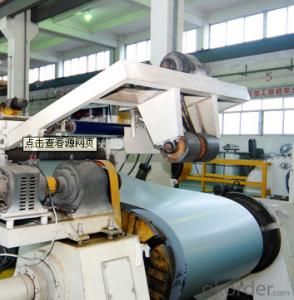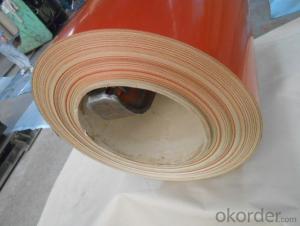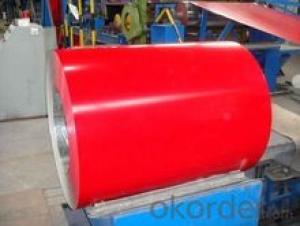Prepainted galvanized steel N4
- Loading Port:
- China Main Port
- Payment Terms:
- TT OR LC
- Min Order Qty:
- -
- Supply Capability:
- -
OKorder Service Pledge
OKorder Financial Service
You Might Also Like
Product Name: COLOR COATED STEEL COIL
* Base Material: Al-Zn Galvanized Steel Coil.//SGLCC
* Top side: 15-25 microns primer microns polyester.
* Back side: 5-8 microns primer epoxy.
* Width:700-,1250mm (The special width 914mm,1219mm,1220mm will be available )
* Thickness:0.17 -1.0mm Thickness tolerance: +/- 0.02mm
* Al-Zn coating: 30-150g /sq.m. or can be provided as clients' requirements
* Color: All RAL colour is available or customer supplying the sample
* Inner diameter of coil: 508mm&610mm.
* Packing: Standard seaworthy packing or according to user's need.
* Weight of each coil: 9 tons max
* Guarantee/ warranty
*Delivery time: Within 10-20 days.
- Q: I want to know because I'm going to Hershey Park on Wednesday and Steel Force looks about the same size, so, I wanted to know. It's not that Steel Force is too big for me.
- steel force breaks the 200ft mark and is a steel out and back roller coaster. Tidal force is a water ride that is about 100 ft tall. If you can do Steel Force then you should be able to handle anything at Hersheypark. the on;y ride they have bigger is the Kissing Tower
- Q: How are steel coils used in the manufacturing of engine mounts?
- Steel coils are commonly used in the manufacturing of engine mounts to provide durability, strength, and flexibility. These coils are typically designed to absorb and dampen vibrations, shocks, and movements generated by the engine during its operation. By integrating steel coils into the engine mount design, manufacturers can ensure better stability, improved performance, and reduced noise levels in vehicles.
- Q: I'm sort of a sword maker. You could say I'm an amateur blacksmith. I want to find a dependable source of high-grade steel. I've made a few blades and from what I know about the difference between true steel and cheap steel, I have yet to work with such. All of the metal I have used could not have been true high carbon spring steel because while they are hard, their properties do not reflect that of true steel. I would sincerely appreciate any guidance on where I could order some fine-quality steel so I could produce a truly fine blade.
- The phrase true steel has no technical meaning. Steel comes in many alloys and grades. Sorry I have no idea where to get different grades and types of steel. McMaster Carr carries a lot of steel bars, sheets, etc.
- Q: I have a Nike SQ Sumo 21 degree and it is a steel shaft. I hit the ball very high with this club and I lose distance. I don't hit any of my other clubs high it's just this one. Is it because of the steel shaft or is it the club? Help please.
- if you are a good player they say steel shaft is better. more consistent. I prefer graphite its lighter and I can flip my wrists easier.
- Q: What are the different coil coating options available for steel coils?
- There are several different coil coating options available for steel coils, each offering unique benefits and applications. 1. Polyester Coil Coating: Polyester coil coatings are the most commonly used option due to their affordability and versatility. These coatings provide good durability, weather resistance, and color retention, making them suitable for a wide range of indoor and outdoor applications. 2. Polyvinylidene Fluoride (PVDF) Coil Coating: PVDF coil coatings offer excellent resistance to fading, chalking, and chemical exposure. They are highly durable, making them ideal for exterior applications where long-term performance is required. PVDF coatings also have good dirt and stain resistance. 3. Polyurethane Coil Coating: Polyurethane coil coatings provide exceptional adhesion and flexibility. They are often used in applications where the steel coils require excellent resistance to abrasion, impact, and corrosion. Polyurethane coatings also offer good color retention and weather resistance. 4. Silicone Modified Polyester (SMP) Coil Coating: SMP coatings combine the benefits of polyester and silicone coatings. They offer enhanced resistance to chalking, fading, and industrial pollutants. SMP coatings are commonly used in agricultural, industrial, and architectural applications. 5. Polyvinyl Chloride (PVC) Coil Coating: PVC coil coatings provide excellent chemical resistance and are frequently used in applications where resistance to acids, alkalis, and solvents is critical. These coatings also offer good color retention and have a low environmental impact. 6. Epoxy Coil Coating: Epoxy coatings provide exceptional adhesion and corrosion resistance. They are often used in demanding environments such as marine or chemical processing industries. Epoxy coatings can be formulated to meet specific performance requirements, making them highly customizable. 7. Acrylic Coil Coating: Acrylic coatings offer excellent color retention, UV resistance, and gloss retention. They are commonly used in architectural applications where aesthetics are important. Acrylic coatings also provide good resistance to weathering and chemicals. It is important to consider the specific requirements of the application when choosing a coil coating option. Factors such as durability, weather resistance, chemical resistance, adhesion, and color retention should be taken into account to ensure the best performance and longevity of the steel coils.
- Q: How are steel coils used in the manufacturing of transportation equipment?
- Steel coils are used in the manufacturing of transportation equipment as they provide a durable and strong foundation for various components such as chassis, frames, and body panels. These coils are typically processed and shaped into specific forms to meet the design requirements of automobiles, ships, trains, and aircraft. The high tensile strength and ability to withstand heavy loads make steel coils an essential material in the transportation industry, ensuring the safety and reliability of the vehicles and equipment.
- Q: Can steel coils be coated with self-cleaning materials?
- Yes, steel coils can be coated with self-cleaning materials. These materials are typically hydrophobic or photocatalytic coatings that help prevent dirt, dust, and other contaminants from sticking to the surface of the steel. The self-cleaning properties of these coatings allow for easier maintenance and longer-lasting aesthetics of the steel coils.
- Q: Can steel coils be coated with zinc?
- Yes, steel coils can be coated with zinc through a process called galvanizing. This coating provides protection against corrosion and increases the durability and longevity of the steel coils.
- Q: Describe and explain how the differences in the properties of the thee main types of steel allow them to be used in different ways. I have some chemistry homework due in for tomorrow (yes I know i left it a bit late but I really don't like chemistry) and I would love it if I could actually at least pretend to my teacher that I know what she's on about this lesson because honestly, I really don't know what she spends so long telling us all. Any help would be appreciated and points for the best answer!
- Hi, Three Main Types of Steel: 1. Carbon Steel Used in making axes, swords, scissors,cutting tools, vehicle frames. Depends on the % of carbon used how soft the steel will be. 2. Stainless Steel Used in the making of crockery, wrist watches, kitchen utensils, cutlery and surgical equipment. Contains different 11% chromium and some % of nickel. 3. Alloy Steel. Used in making drilling parts, vehicle airplane parts. Stainless steel is also alloy steel but, alloy steel with % of other metals is classified separately.
- Q: How are steel coils inspected for straightness?
- Steel coils are inspected for straightness through a variety of methods to ensure they meet the required quality standards. One common method is visual inspection, where trained inspectors visually examine the coil for any visible defects or deformations that may indicate a lack of straightness. They carefully observe the coil's edges, surface, and overall shape to identify any irregularities. Another method used is measuring the coil's straightness using precision instruments. This involves taking measurements at various points along the coil's length and comparing them against specified tolerances. Techniques such as laser measurements or straightness gauges are employed to accurately assess the deviation from the desired straightness. Furthermore, some coils undergo non-destructive testing, such as magnetic particle inspection or ultrasonic testing, to identify any internal defects or stresses that could affect the straightness. These tests can reveal hidden flaws that may not be evident through visual inspection alone. In addition, some manufacturers may employ automated inspection systems that utilize advanced technologies like computer vision or artificial intelligence. These systems can quickly scan the coil's surface and analyze it for any deviations from straightness, providing precise measurements and ensuring consistent quality. Overall, the inspection of steel coils for straightness involves a combination of visual inspection, precise measurements, non-destructive testing, and advanced technologies. These methods aim to identify any deviations from the required straightness, ensuring that only coils meeting the specified standards are used in various applications.
Send your message to us
Prepainted galvanized steel N4
- Loading Port:
- China Main Port
- Payment Terms:
- TT OR LC
- Min Order Qty:
- -
- Supply Capability:
- -
OKorder Service Pledge
OKorder Financial Service
Similar products
Hot products
Hot Searches
Related keywords
